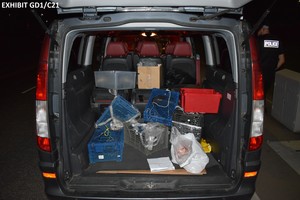Two men fined for illegally fishing for crayfish in Derby
The Environment Agency has successfully prosecuted two men for fishing illegally for crayfish on the River Derwent in Derby in July 2019.

This vehicle was found to have crates and a coil of wire used to make the crayfish traps
At Derby Magistrates on Monday 14 February 2022, Xiao Chaun Zhang, 41, of Prospect Road, Nottingham, was fined £400 and ordered to pay £690 costs while Weiqui Lui, 41, of Watermark Close, Nottingham, was fined £333 and ordered to pay costs of £683.
Commercial trapping of crayfish for human consumption is not permitted, because it can cause the spread of disease (known as the crayfish plague) from invasive signal crayfish to native white claw crayfish. This is fatal to native white claw crayfish.
Trapping also results in an increase in the population of signal crayfish, because it removes the larger crayfish which naturally predate on the smaller ones.
The court was told that the defendants were spotted by police officers, from the Derbyshire Wildlife and Rural Crime Team, near the St Mary’s Bridge on the River Derwent, Derby, around midnight on 23 July 2019.
The officers observed the defendants throwing traps into the river and later found some signal crayfish had been caught. A chicken carcass was also discovered which was being used as bait. The defendants had modified plastic mushroom crates to make traps to catch signal crayfish.
In a nearby vehicle officers found further crates and a coil of wire used to make the crayfish traps in the vehicles, while stacked under the bridge and in the River Derwent were other traps baited with chicken carcasses.
Following the verdict, a spokesperson for the Environment Agency, said:
This case shows how seriously the courts take these offences and we hope the high penalty will act as a deterrent to anyone who is thinking of fishing for crayfish. Anyone wanting to fish for crayfish must contact the Environment Agency to apply for a permit first.
Fishing illegally can incur a fine of up to £2,500 and offenders can also have their fishing equipment seized.
Money raised from fishing licence sales is used to protect and improve fish stocks and fisheries, benefitting anglers and, for those caught cheating the system, we will always prosecute.
The Environment Agency regulates crayfish fishing to protect native white clawed crayfish. Licences can be granted for commercial reasons, fisheries management and scientific research.
Anyone with information about illegal fishing activities can contact the Environment Agency Incident Hotline 24/7 on 0800 80 70 60 or anonymously to Crimestoppers on 0800 555 111.
The charges
On 23 July 2019, Xiao Chuan Zhang/Weiqui Liu, on the River Derwent, Derby, where fishing for or taking fish may be authorised under section 27A Salmon and Freshwater Fisheries Act 1975, did fish for crayfish by means other than a licensable means of fishing namely an authorised crayfish trap contrary to Section 27B(1) Salmon and Freshwater Fisheries Act 1975
Other Information
The Environment Agency carries out enforcement work all year round and is supported by partners including the police and the Angling Trust.
Fisheries enforcement work is intelligence-led, targeting known hot-spots and where illegal fishing is reported.
Any angler aged 13 or over, fishing on a river, canal or still water needs a licence. A 1-day licence costs from just £6 and an annual licence costs from just £30 (concessions available).
Junior licences are free for 13 - 16-year olds. Licences are available from www.gov.uk/get-a-fishing-licence or by calling the Environment Agency on 0344 800 5386 between 8am and 6pm, Monday to Friday.